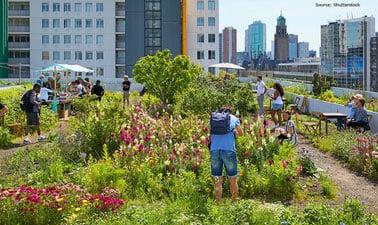MOOC List is learner-supported. When you buy through links on our site, we may earn an affiliate commission.

MOOC List is learner-supported. When you buy through links on our site, we may earn an affiliate commission.
‘In our triumph to dominate the world, we forgot just how much we depend on it.’
Conflict between nature and humans
By 2050, over two-thirds of the world’s population of 10 billion people will be living in cities. This logically leads to increasing competition for natural resources between people and nature. People and businesses struggle to meet their need for space. At the same time, the loss of nature within urban areas leads to a whole host of problems, from heat islands and flooding to air pollution and rising ghg emmisions. This relationship is extremely close, yet, people still tend analyse these issues separately.
Not only does biodiverse and connected greenery and water bodies play a vital role in increasing a city’s climate resilience. Nature is conditional for creating a healthy living environment for its inhabitants. Because when people reconnect to nature, more than a frivolous enjoyment, their physical and mental health improve.
What is urban rewilding
Rewilding is a form of restoration ecology, but not all restoration ecology is rewilding. Though ecology-led, rewilding takes on a multidisciplinary systems level approach to ecosystem structure, function and processes. By prioritizing nature protection and restoration, it creates conditions for complex and self-regulating ecosystems. As such, urban rewilding aims to alleviate disturbances in nature in developed urban areas.
Improve your living environment by reintroducing nature
When individual citizens and urban communities prioritize nature-inclusive and climate-adaptive solutions in their neighbourhoods, the balance between city dwellers and nature can be restored. By trading in pavement and parking lots for green roofs, rain gardens and living walls citizens can achieve:
1. Better climate adaptation: by creating urban storm parcs cities can absorb excess precipitation during extreme weather events, while saving water for dry spells.
2. Alleviation of urban heat islands: a decrease of up to 1°C daytime temperature can limit excess deaths associated with heatwaves.
3. (Re)generate urban biodiversity: by choosing the right tree to plant, complete miniature ecosystems can be created, because compared to exotics plants and trees, indigenous vegetation fosters tenfold amounts of biodiversity.
In this course, you will become familiar with various theories and nature-based solutions related to rewilding your surroundings. You will explore examples around you and sort out the role you can play in the process of urban rewilding. Along the way you can start creating your own personal project.
For whom?
Whether you are a city resident interested in improving the living environment of your city or otherwise interested in a citizen’s perspective on sustainable cities and rewilding topics from, this course is for you. Learn how nature is important for cities and city dwellers from a comprehensive, multidisciplinary approach. Join Wageningen University & Research and create the circumstances for effective urban rewilding near you!
What you'll learn
- Key concepts and different definitions of rewilding
- Explain environmental challenges that modern day urban areas are faced with
- Explain how nature has a positive effect on the health of humans
- Integrate the concept of rewilding in an urban context
- Compare urban rewilding with Nature Based Solutions
- Identify challenges for urban rewilding
- Acquire inspiration on how rewilding can be applied on different settings: big nature reserves; cities; and personal setting.
- How to plan your own project
- Reflect on the concept of rewilding in your own environment
Syllabus
Module 1. Rewilding and Cities
This module will set the scene of the course! In this module you will learn what is rewilding is at its traditional sense. You will also learn what challenges our cities face. We introduce the key concepts and start planning your own project of rewilding.
Module 2. Urban Rewilding
This module introduces the key term of the course: urban rewilding. In this module you will learn how rewilding can be applied in cities, how it looks and why it is unique. You will also continue designing your own project and share your discoveries with others.
Module 3. Practice of Urban Rewilding
This module dives into the practical side of rewilding and brings together what you have learned in this course. In this module you will learn about real-life examples of urban rewilding and practical tips on rewilding yourself. You will finalize your own project and share it to the world! You will finalize your own project and share it with your peers and the world. You will look at other examples to explore even more possiblities to apply rewilding in your personal life!
MOOC List is learner-supported. When you buy through links on our site, we may earn an affiliate commission.
MOOC List is learner-supported. When you buy through links on our site, we may earn an affiliate commission.
